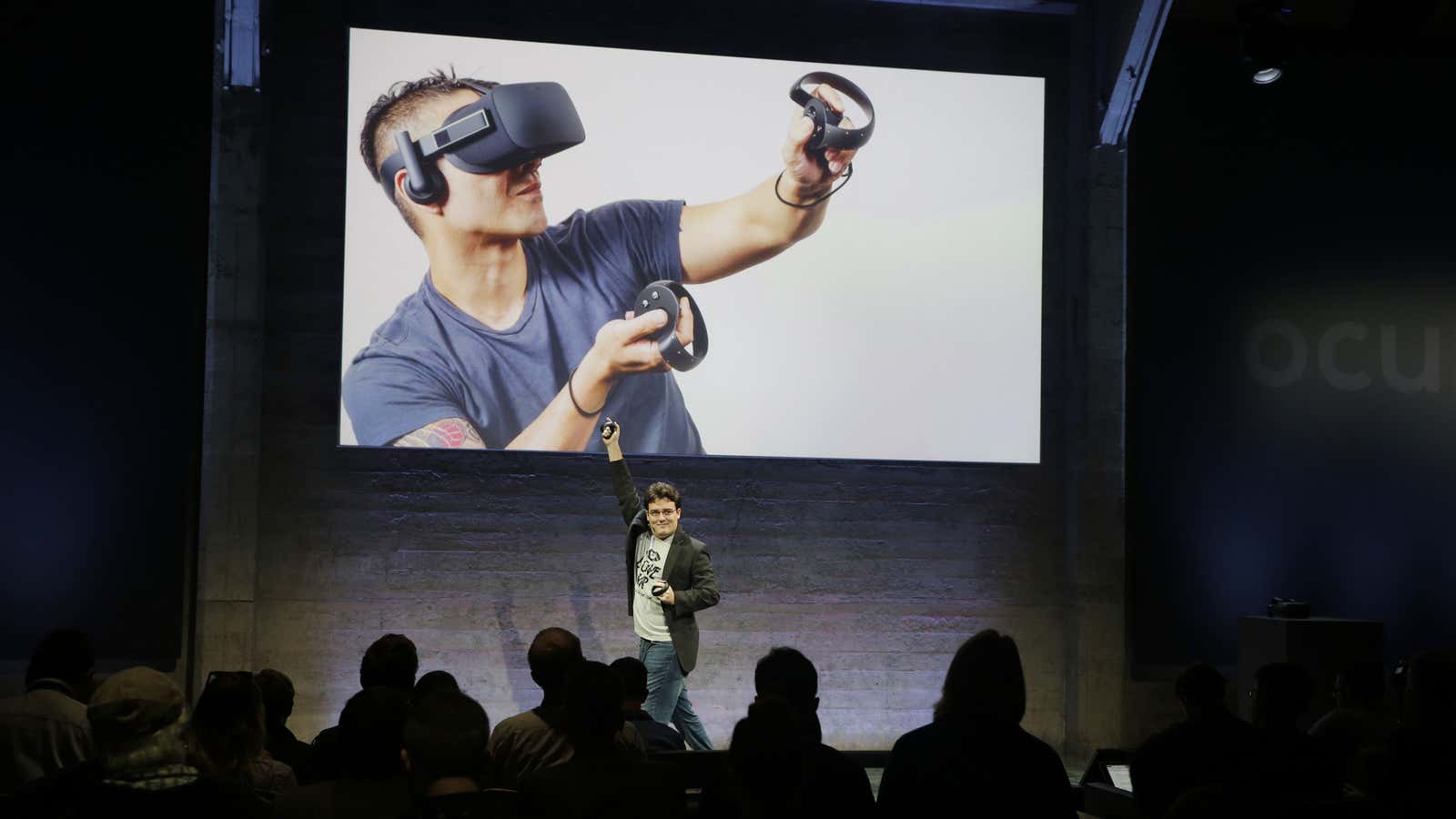Palmer Luckey, the man who developed arguably one of the first true virtual-reality headsets, the Oculus Rift, has left Facebook. The social network giant bought the company that Luckey started with former gaming executives John Carmack and Brendan Iribe for $2 billion in 2014.
Luckey helped kickstart a wave of virtual-reality gaming that is only just being realized. Facebook CEO Mark Zuckerberg, after the sale, referred to VR as “really a new communication platform,” and has explained many times since that he believes the future of communication is immersive. The first consumer Rift headsets went on sale in 2016, and what started out as a simple project to drum up some funds online turned, in theory, into a massive success story for Luckey and his team.
As a teenager, Luckey was obsessed with virtual reality, and wanted to create something to play VR games when he couldn’t find an option he liked on the market. He launched a Kickstarter project, before he was 20, to build simple VR devices and planned to use those funds to build himself something more involved. That’s when Carmack, a developer who founded video games publisher id Software, known for seminal games like Doom and Quake, took interest. He saw the potential in Luckey’s ideas and helped get in front of gamers and developers. As Luckey said in an interview with Eurogamer in 2013: “It went from being maybe 40 or 50 people who were interested in the Kickstarter to—you know, [Carmack] mentioned ‘oh he’s going to make a Kickstarter for these’, and all of a sudden there were thousands of people who were very interested.”
But Luckey seemed unable to take criticism. Many users on Reddit, of which Luckey used to be an active member, and where many of his early ideas for the Rift were formulated, took him and Oculus to task for not supplying headsets to those who backed the original Kickstarter project first, and for not being clear about how much the system would cost, along with other complaints. Luckey often responded on Reddit, but shut down his account last autumn. However, it wasn’t due to the vitriol, but because Luckey was busy funding a group, called Nimble America, to post memes and other disparaging messages about Hillary Clinton, and in support of Donald Trump, online. Luckey was essentially using money from the sale of Oculus to fund mean jokes on the internet. Some developers were not happy, canceling their Oculus projects, Wired reported, and Gizmodo kept a daily watch on Luckey’s seeming disappearance from the web and the world for months after the fact.
Things got worse for Luckey and his Oculus co-founders in February, when a judged ruled that they had developed code while Carmack was still employed by ZeniMax Media, the owners of his id Software company. As Quartz reported, Luckey, Oculus itself, and Iribe would have to split the cost of the $500 million fine owed to ZeniMax. Luckey was personally on the hook for $50 million.
It’s not entirely clear why Luckey left today, rather than soon after the meme controversy. It’s possible, if not likely, however, that he was waiting for equity to vest. Oculus completed its sale to Facebook at the end of March 2014—almost exactly three years ago. Facebook confirmed Luckey’s departure to Quartz, but did not comment on the reason for his leaving, adding:
“Palmer will be dearly missed. Palmer’s legacy extends far beyond Oculus. His inventive spirit helped kickstart the modern VR revolution and build an industry. We’re thankful for everything he did for Oculus and VR, and we wish him all the best.”
Feels bad, man.
